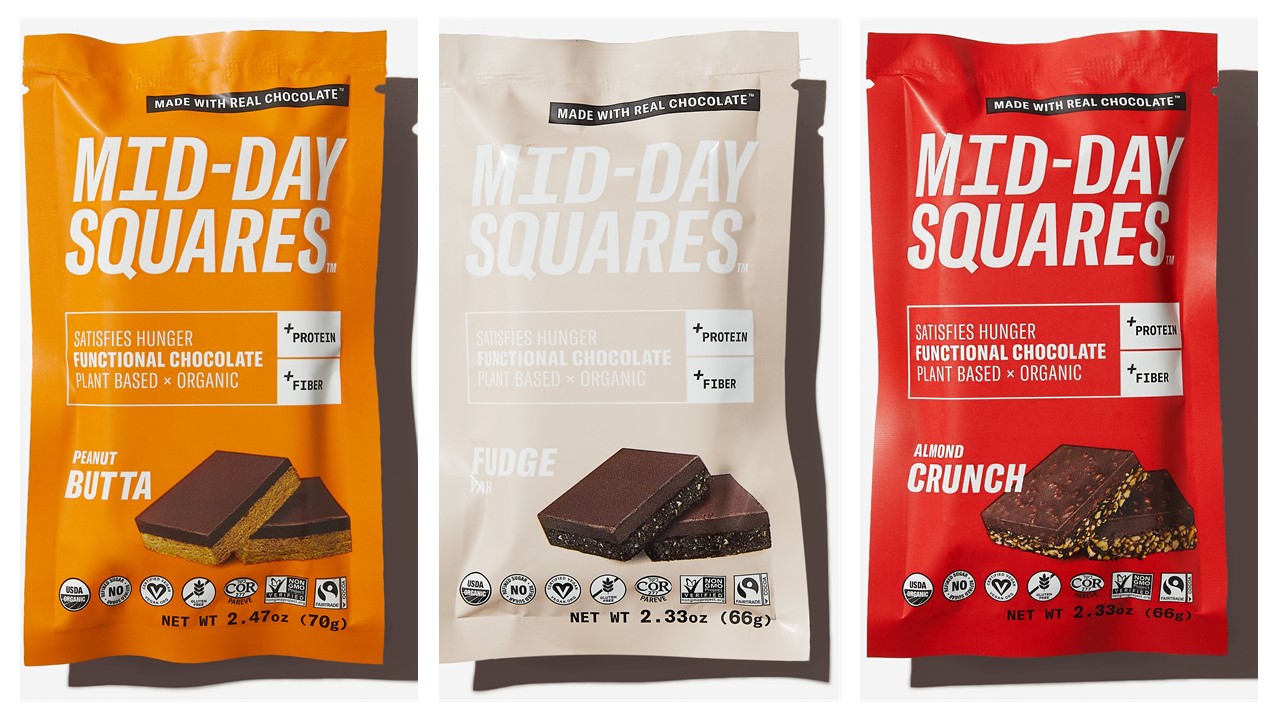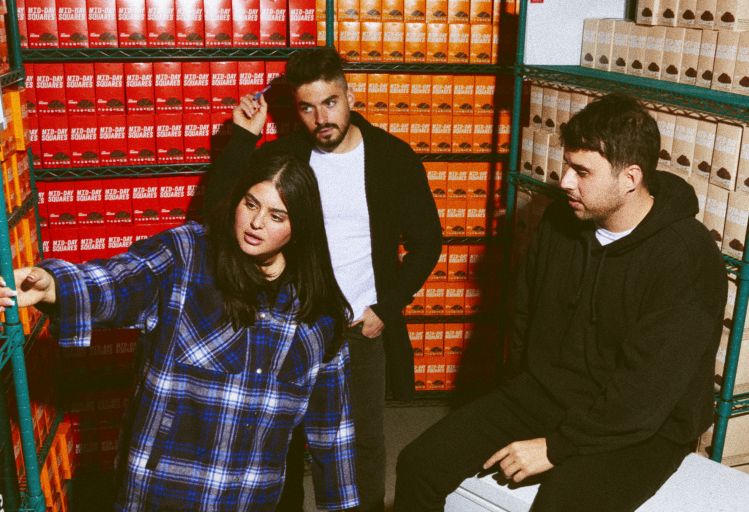
‘Think Shark Tank meets the Kardashians…’ Art imitates life at Mid-Day Squares
While cynics might query Karls’ priorities (Mid-Day Squares is after all, a food company), in a world where most of us spend every waking moment on a cellphone, what emerging CPG brands have to secure, first and foremost, he points out, is our attention.
And if you can’t win that, it doesn’t matter how good your product is, observes Karls, who says that in the early days at least, you are marketing yourself just as much as your products, an insight that launched a podcast and a flurry of Instagram videos tracking the trials and tribulations of running a startup. (Tellingly, the firm’s first outside hire was a videographer.)
“We’re telling that organic story of the good, the bad, the ugly of entrepreneurship… think Shark Tank meets the Kardashians,” says Karls, who co-founded a clothing brand while still at college and describes himself on his LinkedIn profile as the brand’s “rainmaker” and “resident Social-Personality.”
Chocolate gone crazy…
The videos – featuring co-founders Jake Karls, his sister Lezlie Karls Saltarelli, and her husband Nick Saltarelli – range from a few seconds of footage from a trade show, to a lengthier introspective on the impact of losing key team members, to a three-minute, highly-produced MTV-style dance track ‘Chocolate Gone Crazy’ inspired by a cease and desist letter (let’s just say Hershey was not happy with earlier iterations of the brand’s packaging).
“When you create an emotional connection, people want to be part of it,” said Karls, who was speaking to FoodNavigator-USA at the Natural Products Expo West show earlier this month. “They want to know more. So you try and bring them into the ecosystem and they fall in love with the humans, not just the three of us, but our entire team [which is now 60-people strong].”

150-170 calories, 6g protein, 4g fiber, 5g sugar
Founded by Lezlie and Nick in late 2017 (Jake joined the following summer), Mid-Day Squares manufactures its own bars, which combine semi-sweet dark chocolate and on-trend ingredients such as pumpkin seeds, sacha inchi protein, maca root, hemp protein, and prebiotic fiber from Jerusalem artichoke. There are three flavors: Almond Crunch, Peanut Butta, Fudge Yah.
Each 33g square – strapline: ‘everything a chocolate bar isn’t, and everything a protein bar wishes it was’ – has 150-170 calories depending on the flavor, 6g protein, 4g fiber and 5g sugar.
Available online and in about 1,500 stores in Canada, the brand is steadily gaining traction in the US with listings at retailers including Sprouts, Erewhon, and Central Market (H.E.B.), with Whole Foods Market and Wegmans coming online shortly, said Karls. “These retailers are finding us on the media site and they fell in love with the product.
“If you have a great product market fit, and you have a strategy that creates a real emotional connection, you’re creating an unstoppable force,” added Karls, who said the brand – which rebuffed an offer from Hershey in 2021 – generated revenues of $9m in 2021 and aims to generate $16.9m in 2022.
‘We went to 26 co-packers across North America and Europe and they said, we cannot make this chocolate’
So, why not focus all the attention on sales and brand-building, and leave manufacturing to a co-packer?
“We self-manufacture because we went to 26 co-packers across North America and Europe and they said, we cannot make this product,” said Karls. “They said we can do enrobed chocolates with one millimeter thick chocolate, or we could change the structure [the high levels of cocoa butter in the formulation in particular presented challenges, he claimed], but if you want us to make it you’re going to have to make a minimum investment of $5m [a sum which, needless to say, Karls et al did not have lying around].
“So we said, ‘Let’s see if our government can help us debt finance this,’ as we want to create manufacturing jobs in Montreal, and thank god, the machines ended up working, so we went from doing 80 bars a day in a condo to doing 30,000 per shift, or 90,000 per day.”
Since then, Mid-Day Squares has raised money (around US$6.5m) from several backers including Boulder Food Group and Selva Ventures, who believe the company has an attractive product, but have also recognized the team’s talent for publicity (not many startups have 75,000 Instagram followers).

‘We’re also a media company within a company’
While running a manufacturing business is not for the faint-hearted, doing everything itself has given Mid-Day Squares a degree of flexibility and agility that has proved particularly valuable during the pandemic, when many emerging brands found themselves at the bottom of the priority list for co-packers, and enabled them to make rapid packaging changes (following those cease and desist letters… the firm also received one from RXBAR/Kellogg).
“Owning your own manufacturing allows you to move quickly,” said Karls, “although the downside, is that if your machine breaks down, it’s your problem. But we have hired a new director of operations, a phenomenal guy [former PepsiCo exec Kevin Pocklington], which means that we won’t have to stress so much as founders anymore about this kind of thing.”
He added: “We’re also a media company within a company [all those videos are made in house], and these things are both very costly, so we’ve raised money from people that really believe in pushing our content, because every month, we drive 8-10,000 people to the store locator [on the website].
“That’s over 100,000 people a year with intent to purchase and that’s coming down the efforts of the marketing team.”
Driving incremental growth in the refrigerated snacks set
So, where are brick & mortar retailers merchandising the squares, and how are they viewing the brand?
“Perfect Bar did a great job on pioneering the [refrigerated snacking] set,” said Karls, “and brands like Honey Mama’s [cocoa truffle bars] and Clio Snacks [yogurt bars] have launched great innovations, but we felt there was no real chocolate bar/protein bar hybrid.
“When we entered the set, it was actually incremental; people were buying a Perfect Bar and Mid-Day Squares, whereas some of the other me-too bars retailers tried bringing in were just cannibalizing things.
“We are generally stocked next to Perfect Bars, which are sometimes in the dairy set, sometimes in refrigerated snacking sets, but what we’re pushing right now is getting in the produce set, because from our internal research, people are most often eating Mid-Day Squares with cut-up fruit, or with coffee.”
‘We started to get messages from our customers saying can you do a resealable pack or just sell one square at a time?’
Another insight from consumer research is that some people want individually wrapped squares, said Karls.
“We’ve always packaged them in sets of two, but then we started to get messages internally from our customers saying can you do a resealable pack or can you just sell one square in a pack?”
The team initially “kind of ignored” this feedback, because it was working on a million other things and was set up for two-packs, he said.
“But now’s the time to do it, because people are going out again [after the pandemic] and going back to the office and the gym and they want it on the go, and so we decided to move down to one square in the $2 to $2.49 price range and now we’re getting more trial.
“People are eating it as an afternoon snack that makes them feel full, but not bloated.”
Indulgent-tasting, with real chocolate, the squares are not too sweet (5g sugar) and have a reasonable amount of protein (6g) without the sticky, chalky texture of many protein bars, he said.
“It’s a chocolate snack that makes you feel good. It’s also an everyday snack, so we’re seeing strong velocities.”
Watch Chocolate Gone Crazy below:

